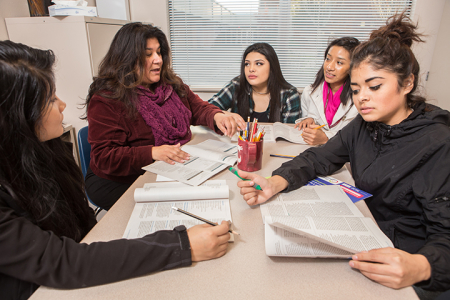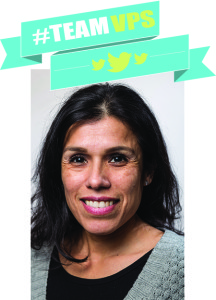Center for International Studies launches at Fort
Fort Vancouver High School launched its Center for International Studies in fall 2015, establishing an international focus for the entire school. Students are learning how to become globally competent—how to see connections between the school and community, develop values that honor all people, lead and communicate effectively.
Fort now offers a Travel Center to connect students with travel and volunteering opportunities at home and abroad. Students also can enroll in an international studies course.
As part of the Asia Society’s International Studies Schools Network, or ISSN, Fort belongs to a nationwide community of globally focused K-12 schools. Last November, an ISSN team observed more than 50 Fort classrooms and conducted 30 focus groups and interviews with students, parents and community and staff members. Results indicated strengths in Fort’s global focus; safe, inclusive and respectful community; learning opportunities for the faculty; and partnerships that support students’ well-being.

Photos above, from left: Fort Vancouver seniors and Adelante members Ana Lopez, Yuri Mendoza, Escarlet Pelayo and Cindy Sanchez Barbosa.
Escarlet Pelayo grew up speaking Spanish. In elementary school, she began to learn English. “I got it quick,” she says. Soon she was deciphering English for her parents.
Pelayo, now a Fort Vancouver High School senior who wants to become a dental hygienist, is part of a school club called Adelante. The name means “forward” in Spanish. That’s where its members are looking, as well as leading by example.
Recently, two translation projects introduced students to new opportunities to do both.
Forward

From left: Fort senior Ana Lopez, League of United Latin American Citizens President Diana Perez, senior Escarlet Pelayo, mentor Louisa Cruz and senior Yuri Mendoza discuss the students’ translation work.
The one-year-old Adelante is affiliated with the local chapter of the League of United Latin American Citizens, or LULAC. The Southwest Washington LULAC wants the students to think large by connecting to their community today.
Helping to facilitate that process is the students’ mentor, Louisa Cruz, a senior at Washington State University Vancouver and 2011 Fort graduate.
Cruz has seen a transformation in the Adelante members. “It may have started out as fun, but later on they get to thinking of something more than just high school. It’s really good to see that,” she says.
A recent grant has created opportunities for community involvement and civic engagement among Adelante members. Those experiences have included meeting the mayor of Olympia, Washington; watching a Vancouver City Council meeting; volunteering; and attending a ribbon-cutting for Vancouver’s waterfront extension.
Voices
It’s not uncommon for several of the students who belong to Adelante to slip easily between English and Spanish. Both languages have a place intheir lives.
Bilingualism made a few Adelante students a natural fit for two English-to-Spanish projects. The first was a video of candidate statements from the November 2015 general election voters’ pamphlet. The second was a promotional video for The Vine, C-TRAN’s new transit line connecting downtown Vancouver to the Vancouver Mall. Students also helped C-TRAN with its multicultural outreach efforts.
Senior Ana Lopez, who with fellow senior Odalys Sanchez-Zamora spent a month converting candidate statements last fall, approached the work like studying a second language. “When I was learning English, I would get a dictionary and look at words,” she says.
Over the summer, Pelayo, Sanchez-Zamora and Fort seniors Yuri Mendoza and Cindy Sanchez Barbosa contributed to the video for The Vine. Fort graduates Esmeralda Sanchez and Fernando Arangute also assisted. Sanchez-Zamora provided the majority of the narration for the video.
The team found that interpretation between languages is not a straightforward process. The process called for multiple close readings, research and consultations with their mentors and parents. They pored over each sentence to rephrase it in their own words and recast ideas with greater clarity for their audience.
Pelayo explains, “When you translate something exactly into Spanish, it won’t sound right. You have to transition words and add words.”
“I tried to make it easy to understand,” says Mendoza, whose first language was Spanish and who plans to study nursing after high school.
Pelayo says that the work gave “us students a chance to use our voices.”
“They gained a tremendous amount of knowledge,” says LULAC President Diana Perez. She advises the club along with Family-Community Engagement Coordinator Diana Avalos-Leos.

Meet Family-Community Engagement Coordinator Diana Avalos-Leos.
“The students were a pure delight to work with from the onset,” says C-TRAN Bus Rapid Transit Community Involvement Coordinator Katy Belokonny. “C-TRAN staff found that this was a lovely group of individuals who were thoughtful in the care they gave to selecting the project they wanted to pursue, dedicated to producing a high-quality final project and extremely helpful in distributing the video once it was finalized.”
A diverse school
Fort, which this fall launched its Center for International Studies, is a good place to practice and learn languages, according to students. “I meet people from other cultures. And I tell them about my culture,” Mendoza says.
“I like how much diversity is here,” says Lopez, who is planning a career in hospitality and tourism in which she can employ her bilingual skills. “You walk the halls and hear people talk in differentlanguages.”
That diversity makes Fort a natural fit for organizations such as Adelante. And connections gained through the club have underscored the value of knowing another language and bolstered a senseof pride.
Says Pelayo, “You can use your bilingualism to do something good and help others understand. … I’m thankful to have my bilingual side.”
